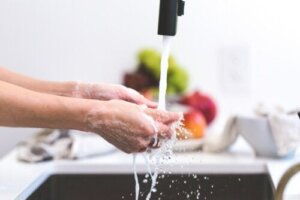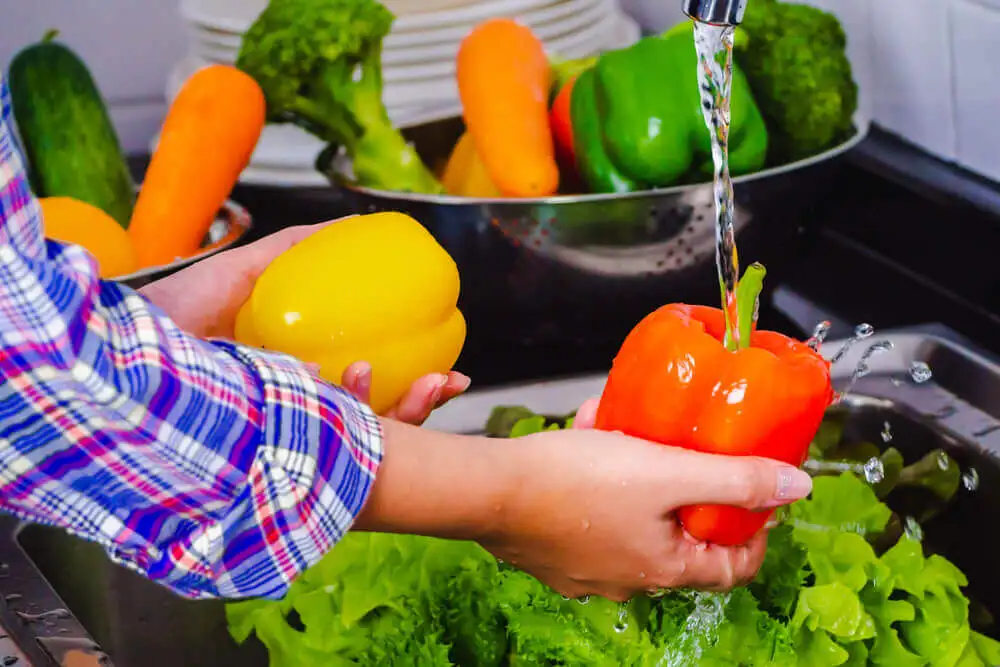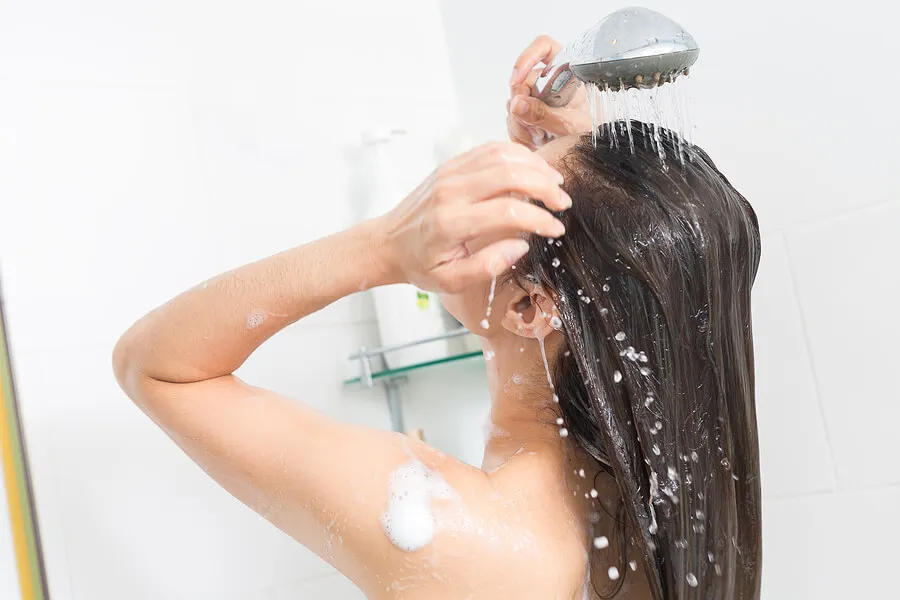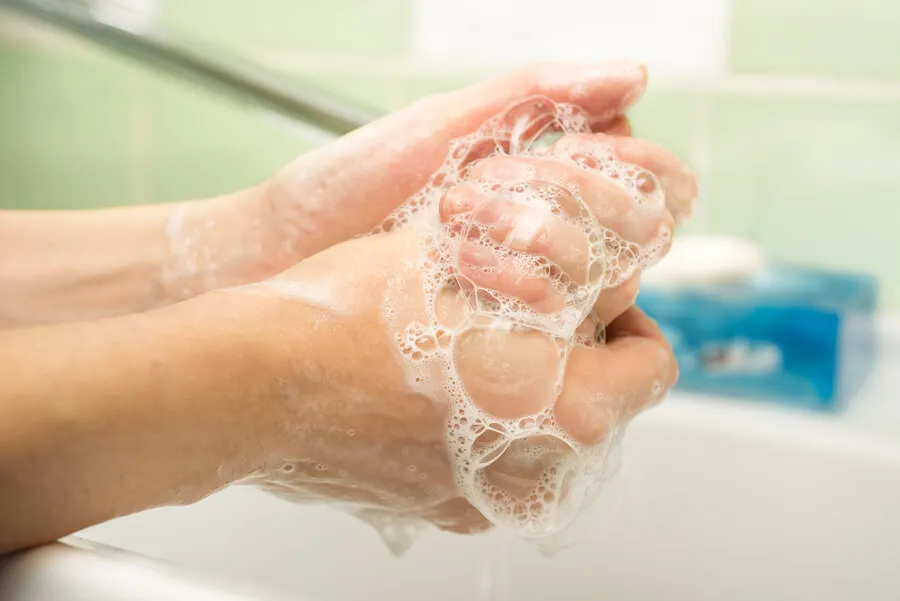Why is Hand Washing Important?


Reviewed and approved by the doctor José Gerardo Rosciano Paganelli
Hand washing is very important. Through touch, we take in information and substances from the environment. This information can be both positive (food) and negative (pathogens, toxic substances).
Therefore, we must take special care with the hygiene of our hands. In this article, we explain why it’s so important to wash your hands and the best way to do it. Take note!
What do we use our hands for?
Thanks to our hands, we’re able to carry out different daily activities through which we can catch or transmit germs, such as:
- Understanding the world around us
- Recognizing the texture of an object
- Caressing our loved ones
- Holding a purse
- Preparing food
- Eating
- Playing, etc
In this way, if we neglect our hygiene, we can be harming not only our health, but that of the people around us – even our loved ones.

Personal hygiene and health
Since humans are born, they come into contact with their environment. We begin to relate to elements that are totally foreign to us. Therefore, our immune systems begin to strengthen, which prepares us to face future aggressions.
However, it’s not always possible to come out of these confrontations unscathed. As a consequence, diseases caused by viruses and bacteria that manage to enter the body appear.
That’s why for centuries people have been looking for ways to avoid or reduce the unfavorable influence of the outside world on their health. After numerous failures, they found the answer, which lasts to this day, and it’s good hygiene.
Hand washing helps to eliminate impurities that adhere to the skin of the hands and make us sick. In addition, there are other types of hygiene that we must take into account:
- Food hygiene, which guarantees the correct state of the products we consume;
- Mental hygiene, which takes care of the perfect development and psychological functioning of the person and his or her community.
However, the hygiene that most interests us in this article is the one that depends on each of us individually: personal hygiene.
Surely you may be thinking, “But I’m clean! I shower every day!” However, this alone is not enough to talk about proper personal hygiene. In addition, we must take into account several aspects whose importance we often fail to recognize.
We think you may be interested in reading this, too: How to Wash Fruits and Vegetables During the Coronavirus Pandemic
Elements of good personal hygiene
Dietary hygiene
Who knew? Yes, a balanced and healthy diet is the basis of good health. Thus, a healthy diet can help boost the immune system, which helps protect us from germs and external agents.
Also, keep in mind that the body needs enough carbohydrates, vitamins, minerals, protein, and fiber to perform its vital functions, even if you’re trying to lose weight. It’s also important to eat about six small meals a day:
- Breakfast
- A mid-morning snack
- Lunch
- A mid-afternoon snack
- Lunch
- A light dinner
Don’t forget to chew your food well; this is an essential rule. That way, you will crush what you consume well and also facilitate its digestion. It’s also advisable to drink plenty of water – at least eight glasses a day.
Air and ventilation hygiene
Make sure to avoid dust and smoke, as well as polluted air. These threeharmful elements can:
- Cause allergies
- Damage your respiratory system
- Cause toxic substances to build up in your tissues
In fact, some studies show that air pollution could be responsible for about 800,000 premature deaths each year. This is why it’s important to maintain proper hygiene at home:
- Use the vacuum cleaner to remove dust, pet hair, and dander, as well as dust mites that accumulate in corners and carpets.
- Avoid excessive heat in the rooms and make sure they are always well-ventilated.
- Finally, a very simple tip: always breathe through your nose, since the air is filtered and heated before reaching your lungs.
Bodily hygiene

The external organs of the body perform extremely important functions, including protection. Therefore, they are much more exposed than others to infections.
Correct personal hygiene can help us avoid damage to the skin, eyes, mouth, and hands. Here are some measures to take into account:
- Body cleansing: Baths or showers should be performed daily. Therapeutic and sedative baths are also advisable.
- Hair care: Hair and scalp cleansing should be done at least twice a week. Care should be taken to rinse it properly and dry it well.
- Eye care: You need good lighting for reading, writing, and various activities. Protect your eyes from glare, accidents, and infections.
- Ear canal cleaning: It’s advisable to have it done by a doctor to prevent eardrum injuries.
- Wash your hands: We constantly pick up objects and then rub our eyes or any other part of the body. Proper hand washing will prevent the transmission of infections.
OK. So already gone over some important points of personal cleanliness. Now, we’ll go into the importance of hand washing, since this is the main topic of this article.
Like this article? You may also like to read: Everything You Need to Know About Cytomegalovirus Infection
Why is hand washing so important? How should we do it?
Hand washing is one of the most important personal hygiene habits. As we explained before, through them we come into contact not only with the outside world but also with other people. Therefore, they are great transmitters of diseases and parasitic infections.
Having dirty or contaminated hands and taking them to the mouth, eyes, or handling food with them is the easiest way to get sick. And what about our nails, where a large number of microorganisms accumulate from the most diverse sources?
Don’t doubt it: the best way to avoid infections of this type is to have good hygienic habits. The key is to wash your hands properly both before and after the following activities:
- Cooking or eating
- Going to the bathroom to defecate or urinate
- Throwing away or handling the garbage
In general, we should wash them any time we come into contact with any contaminated item. How do we do it? Well, here are the steps to wash your hands properly.
The steps to wash your hands properly

The World Health Organization (WHO) has always emphasized the importance of good hand hygiene. For this reason, it has numerous documents on the best way to wash your hands. We encourage you to consult their website. In the meantime, here’s a summary:
- Moisten your hands with plenty of clean water.
- Rub them with soap so that you get plenty of lather.
- Rub your hands vigorously for 20 seconds, both the back and the palms. Also, check under your fingernails and between your fingers.
- Rinse with clean water.
- Repeat if necessary.
- Rinse with plenty of water.
- Finally, dry your hands well with a clean towel.
Now you know why you should wash your hands and how to do it, we hope you will follow the steps and tips provided here. Maintain excellent hygiene, and your health will thank you for it!
All cited sources were thoroughly reviewed by our team to ensure their quality, reliability, currency, and validity. The bibliography of this article was considered reliable and of academic or scientific accuracy.
- Aiello, A. E., Coulborn, R. M., Perez, V., & Larson, E. L. (2008). Effect of hand hygiene on infectious disease risk in the community setting: a meta-analysis. American journal of public health, 98(8), 1372-1381. Available at: https://ajph.aphapublications.org/doi/full/10.2105/AJPH.2007.124610. Accessed 03/03/2020.
- Bloomfield, S. F., Exner, M., Signorelli, C., Nath, K. J., & Scott, E. A. (2012, July). The chain of infection transmission in the home and everyday life settings, and the role of hygiene in reducing the risk of infection. In International Scientific Forum on Home Hygiene. Available at: https://www.ifh-homehygiene.org/review/chain-infection-transmission-home-and-everyday-life-settings-and-role-hygiene-reducing-risk. Accessed 03/03/2020.
- Curtis, L., Rea, W., Smith-Willis, P., Fenyves, E., & Pan, Y. (2006). Adverse health effects of outdoor air pollutants. Environment international, 32(6), 815-830. Available at: https://doi.org/10.1016/j.envint.2006.03.012. Accessed 03/03/2020.
- International Scientific Forum on Home Hygiene (2002). Available at: https://www.ifh-homehygiene.org/care-guideline-best-practice/guidelines-prevention-infection-and-cross-infection-domestic-0. Accessed 03/03/2020.
- Kafeshani, M. (2014). Diet and immune system. Immunopathologia Persa, 1(1), e04. Available at: http://immunopathol.com/Article/ipp-4. Accessed 03/03/2020.
- Organización Mundial de la Salud (2012). Higiene de las manos: ¿por qué, cómo, cuándo?. Available at: https://www.who.int/gpsc/5may/tools/ES_PSP_GPSC1_Higiene-de-las-Manos_Brochure_June-2012.pdf?ua=1. Accessed 03/03/2020.
- Pedersen, A. M., Bardow, A., Jensen, S. B., & Nauntofte, B. (2002). Saliva and gastrointestinal functions of taste, mastication, swallowing and digestion. Oral diseases, 8(3), 117-129. Available at: https://doi.org/10.1034/j.1601-0825.2002.02851.x. Accessed 03/03/2020.
This text is provided for informational purposes only and does not replace consultation with a professional. If in doubt, consult your specialist.








